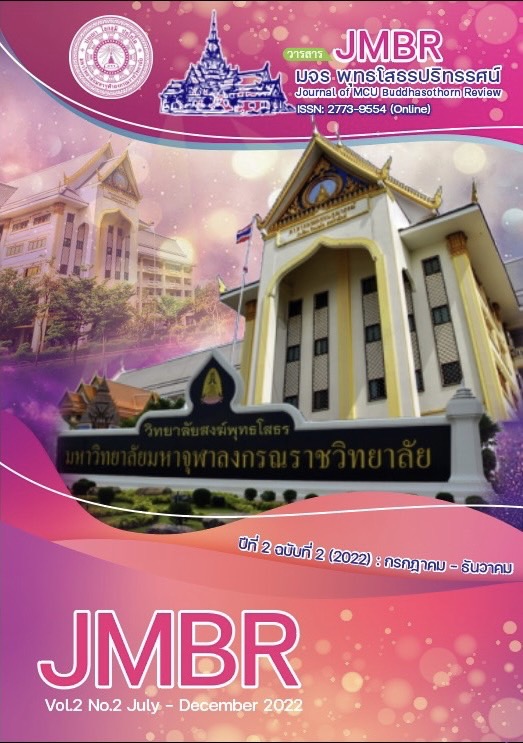Politics and Governance According to the Principle of APARIHANIYADHAMMA in Buddhism Politics and Governance According to the Principle of APARIHANIYADHAMMA in Buddhism
Main Article Content
Abstract
This academic article presents what is called "politics", which has a Buddhist meaning that proper handling according to the laws of nature for many people to live together in peace. However, what is called politics is a hidden moral system that this is useful and necessary. If done right, it will be useful. However it should be clearly separated for education and moral practice in the form of politics and government. Especially in making politics and government in the form of religion because the word "religion" is a state of complete morality. However, the current Thai politics and government has been introduced "Aparihaniyadhamma 7" which is the principle that causes prosperity, there is no deterioration both personally and collectively. It is a principle that prevents group administration from deteriorating but only promoting. If a person, a group of people or a group can follow the Aparihaniyadhamma, that person, people or group of people will have only prosperity and progress in life without deterioration and damage which is very favorable for practitioners, administrators, groups and people in society. Therefore, the country's leaders and those involved should govern under the principles of dharma to instill in the new generation to realize and understand the essence of Thai politics and Buddhism in order to promote and carry on the Dharma government to be continued and existed.
Article Details

This work is licensed under a Creative Commons Attribution-NonCommercial-NoDerivatives 4.0 International License.
ต้นฉบับที่ได้รับการตีพิมพ์ในวารสาร มจร พุทธโสธรปริทรรศน์ วิทยาลัยสงฆ์พุทธโสธร มหาวิทยาลัยมหาจุฬาลงกรณราชวิทยาลัย ถือเป็นกรรมสิทธิ์ของวิทยาลัยสงฆ์พุทธโสธร มหาวิทยาลัยมหาจุฬาลงกรณราชวิทยาลัย ห้ามนำข้อความทั้งหมดหรือบางส่วนไปพิมพ์ซ้ำ เว้นเสีย แต่ว่าจะได้รับอนุญาตจากวิทยาลัยฯ เป็นลายลักษณ์อักษร และเพื่อให้เป็นไปตามกฎหมายลิขสิทธิ์ ผู้เขียนทุกท่านต้องลงลายมือชื่อในแบบฟอร์มใบมอบลิขสิทธิ์ บทความให้แก่วารสาร พร้อมกับบทความต้นฉบับที่ได้แก้ไขครั้งสุดท้าย นอกจากนี้ ผู้เขียนทุกท่านต้องยืนยันว่าบทความต้นฉบับที่ส่งมาตีพิมพ์นั้น ได้ส่งมาตีพิมพ์เฉพาะในวารสาร มจร พุทธโสธรปริทรรศน์ เพียงแห่งเดียวเท่านั้น
References
คนอง วังฝายแก้ว. (2554). แนวคิดการปกครองตามรูปแบบประชาธิปไตยตามทัศนะพระพุทธศาสนา. สืบค้นเมื่อ 17 มกราคม 2565. จาก https://www.gotoknow.org/posts.
จิรโชค (บรรพต) วีระสัย และคณะ. (2540). รัฐศาสตร์ทั่วไป. กรุงเทพฯ: สำนักพิมพ์มหาวิทยาลัยรามคำแหง.
จักษ์ พันธ์ชูเพชร. (2549). การเมืองการปกครองไทยจากยุคสุโขทัยสู่สมัยทักษิณ. พิมพ์ครั้งที่ 5. กรุงเทพฯ: บริษัท มายด์ พับลิชชิ่ง จำกัด.
จำนงค์ ทองประเสริฐ. (2520). แบบเรียนศาสนาสากล. กรุงเทพฯ: สำนักพิมพ์วัฒนาพานิช.
ชูศักดิ ทิพย์เกสร. (2551). พระพุทธศาสนาในศรีลังกา. กรุงเทพฯ: เชนปริ้นติ้ง.
ชัยอนันต์ สมุทวณิช. (2530). ปัญหาการพัฒนาทางการเมืองไทย. พิมพ์ครั้งที่ 1. กรุงเทพฯ: สำนักพิมพ์ จุฬาลงกรณ์มหาวิทยาลัย.
ดานุภา ไชยพรธรรม. (2537). การเมืองการปกครอง (ฉบับชาวบ้าน). กรุงเทพฯ: สำนักพิมพ์มายิก.
นรี ภวกานตานันท์. (2538). การเมืองการปกครองในแนวพุทธศาสนา: ศึกษาจากนักคิดและพระไตรปิฎก. วิทยานิพนธ์มหาบัณฑิต. รัฐศาสตร์ (การปกครอง) จุฬาลงกรณ์มหาวิทยาลัย. บัณฑิตวิทยาลัย.
นิธิ เอี่ยวศรีวงศ์. (2543). พระพุทธศาสนาในความเปลี่ยนแปลงทางสังคมไทย. กรุงเทพฯ: มูลนิธิโกมลคีมทอง.
นงเยาว์ พีระตานนท์. (2551). การเมืองการปกครอง. กรุงเทพฯ: สถาบันราชภัฏสวนดุสิต.
บรรพต วีระสัย. (2540). ความคิดเชิงทฤษฎีการเมืองในพุทธศาสนา ในทฤษฎีการเมืองสมัยสุโขทัยและสมัยกลาง. กรุงเทพฯ: มหาวิทยาลัยรามคําแหง.
ปรีชา ช้างขวัญยืน. (2542). ธรรมรัฐ-ธรรมราชา. กรุงเทพฯ: โครงการตำรา คณะอักษรศาสตร์ จุฬาลงกรณ์มหาวิทยาลัย.
พระเทพเวที (ประยุทธ ปยุตโต). (2531). กรรมตามนัยแห่งพุทธธรรม. กรุงเทพฯ: อัมรินทร์พริ้นติ้งกรุ๊ฟ.
พระมหายุทธพิชัย สิริชโย. (2561). การบริหารงานตามหลักอปหานิยธรรม. วารสารสมาคมศิษย์เก่า มหาวิทยาลัยมหาจุฬาลงกรณราชวิทยาลัย.
ลิขิต ธีรเวคิน. (2546). ประชาธิปไตยและการปฏิรูปการเมืองไทย. กรุงเทพฯ: เจ้าพระยาระบบการพิมพ์.
ลัทธิกาล ศรีวะรมย์ และสุชัย ทองแก้วกูล. (2538). หลักรัฐศาสตร์. กรุงเทพฯ: SR printing.
สมภาร พรมทา. (2539). ปรัชญาสังคมและการเมือง. พิมพ์ครั้งที่ 2. กรุงเทพฯ: สำนักพิมพ์จุฬาลงกรณ์มหาวิทยาลัย.
Ambedkar, B.R. (2018). Dr.Ambedkar and democracy: an anthology/edited by Christophe Jaffrelot and Narender Kumar. New Delhi: Prentice Hall of India Prive Ltd.


